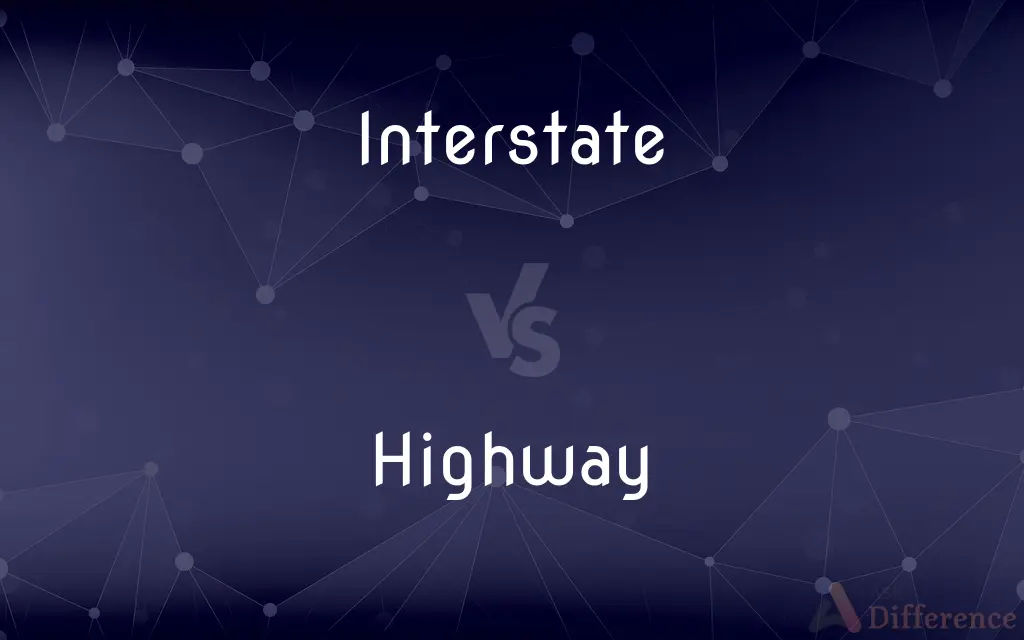Interstate vs. Highway — What's the Difference?
By Fiza Rafique & Urooj Arif — Updated on April 17, 2024
Interstate highways are part of a federal network ensuring national connectivity, with strict standards for access and design; whereas, highways can be any major public road, including state roads and local routes, with more varied standards.

Difference Between Interstate and Highway
Table of Contents
ADVERTISEMENT
Key Differences
Interstate highways are governed by federal regulations and are designed for high-speed, long-distance travel, featuring multiple lanes and access control. Whereas, highways encompass a broader category of major roads that can range from two-lane rural roads to multi-lane urban expressways.
On the Interstate, access is limited to specific entry and exit points to maintain traffic flow, ensuring high speeds and safety. Highways, on the other hand, may have at-grade crossings and direct access from properties and side streets, which can lead to slower speeds and increased congestion.
Interstates are required to meet specific standards such as minimum lane widths and maximum grades. In contrast, highway standards can vary significantly depending on the state and the type of highway, reflecting local needs and conditions.
The funding for Interstate construction and maintenance predominantly comes from federal sources, emphasizing their role in national transport. Highways, however, may be funded and maintained by state, local, or federal governments, depending on their designation.
Signage on Interstates is standardized with specific symbols and numbering systems to aid interstate travel. Highways use a more diverse range of signage, influenced by local practices and requirements.
ADVERTISEMENT
Comparison Chart
Jurisdiction
Federally controlled
State or local control
Access Points
Limited access (entry and exit ramps)
Variable access (some with at-grade crossings)
Design Standards
Uniform standards (e.g., minimum lane width)
Variable standards
Funding
Primarily federal
State, local, or federal
Signage
Standardized national system
Diverse, local variations
Compare with Definitions
Interstate
A part of the National Highway System designed for high-speed long-distance travel.
The I-95 Interstate runs along the East Coast of the U.S.
Highway
A major public road that can be anything from a local street to a multi-lane urban expressway.
The Pacific Coast Highway offers stunning ocean views.
Interstate
Built to federal standards with controlled access.
The Interstate near my home does not allow any direct commercial access.
Highway
Funding can come from state, local, or federal sources.
The new highway expansion was funded by the state.
Interstate
Features uniform signage and numbering across states.
All Interstate signs are shield-shaped with red, white, and blue.
Highway
Signage varies by state and locality.
Highway signs in this state are green with white lettering.
Interstate
Prohibits certain types of traffic, such as pedestrians and slow vehicles.
Bicycles are not allowed on the Interstate.
Highway
Often allows all types of vehicles and pedestrians.
The highway through the city center has pedestrian crossings.
Interstate
Primarily funded by the federal government.
Interstate repair projects often receive federal funds.
Highway
May have at-grade crossings and varying access points.
The highway in my town is crossed by several other local roads.
Interstate
Involving, existing between, or connecting two or more states.
Highway
A highway is any public or private road or other public way on land. It is used for major roads, but also includes other public roads and public tracks.
Interstate
One of a national system of expressways connecting major population centers in the United States.
Highway
A main road, especially one connecting major towns or cities
The highway to success
A six-lane highway
Interstate
Of, or relating to two or more states.
Highway
A main public road, especially one connecting towns and cities.
Interstate
Crossing states (usually provincial state, but also e.g. multinational sense).
The truck driver drove interstate to unload.
Highway
(historical) A road that is higher than the surrounding land and has drainage ditches at the sides
Interstate
(US) A freeway that is part of the Interstate Highway System.
Highway
A main public road, especially a multi-lane, high-speed thoroughfare.
Interstate
Pertaining to the mutual relations of States; existing between, or including, different States; as, interstate commerce.
Highway
(figurative) A way; a path that leads to a certain destiny
You're on a highway to greatness.
Interstate
An interstate highway, part of the United States Interstate Highway system.
Highway
Any public road for vehicular traffic.
Interstate
Involving and relating to the mutual relations of states especially of the US;
Interstate Highway Commission
Interstate highways
Interstate Commerce Commission
Interstate commerce
Highway
(computing) bus
Highway
To travel on a highway
Highway
A road or way open to the use of the public, especially a paved main road or thoroughfare between towns; in the latter sense it contrasts with local street; as, on the highways and byways.
Highway
A major road for any form of motor transport
Common Curiosities
Are all highways funded by the federal government?
Not all; while Interstates usually receive federal funding, other highways can be funded at the state or local level.
Why do Interstate signs have a uniform look?
This uniformity helps in recognizing the routes easily, especially for drivers traveling across state lines.
What is an Interstate highway?
An Interstate highway is a road in the Interstate Highway System, a network of highways that spans across multiple states to promote efficient interstate travel.
Can highways be part of the Interstate system?
Yes, many highways are part of the Interstate system but must meet the specific standards to be designated as such.
Can state highways also be called Interstates?
No, while state highways may meet some Interstate standards, they are not part of the federal Interstate system unless specifically designated.
How do Interstates differ from other highways?
Interstates have controlled access, no at-grade crossings, and meet specific federal standards, unlike other highways which might have more varied characteristics.
Can all types of vehicles use the Interstate?
No, vehicles like bicycles and those that cannot maintain a minimum speed are typically prohibited on Interstates.
What are the benefits of limited access on Interstates?
Limited access promotes safer and faster travel by reducing conflicts and points of congestion.
Do all highways allow pedestrian access?
Many do, especially urban and rural highways, but this varies based on specific local regulations and road design.
What role do local governments play in highway maintenance?
Local governments often handle the maintenance of highways that are not part of the Interstate system.
What determines a road's classification as an Interstate?
A combination of factors like federal funding, meeting design standards, and being part of a national network.
What is the purpose of the Interstate system?
It was designed to enhance national defense and improve transportation of goods and people across the country.
How are highway speed limits determined?
Speed limits on highways are typically set by state or local authorities and can vary widely.
Is there a difference in road quality between Interstates and other highways?
Typically, Interstates maintain a higher standard of road quality due to federal regulations and funding.
Are there tolls on Interstates?
Some Interstates do have tolls, although the original design of the system minimized toll roads.
Share Your Discovery

Previous Comparison
Pathology vs. Pathophysiology
Next Comparison
Mildew vs. MoldAuthor Spotlight
Written by
Fiza RafiqueFiza Rafique is a skilled content writer at AskDifference.com, where she meticulously refines and enhances written pieces. Drawing from her vast editorial expertise, Fiza ensures clarity, accuracy, and precision in every article. Passionate about language, she continually seeks to elevate the quality of content for readers worldwide.
Co-written by
Urooj ArifUrooj is a skilled content writer at Ask Difference, known for her exceptional ability to simplify complex topics into engaging and informative content. With a passion for research and a flair for clear, concise writing, she consistently delivers articles that resonate with our diverse audience.














































